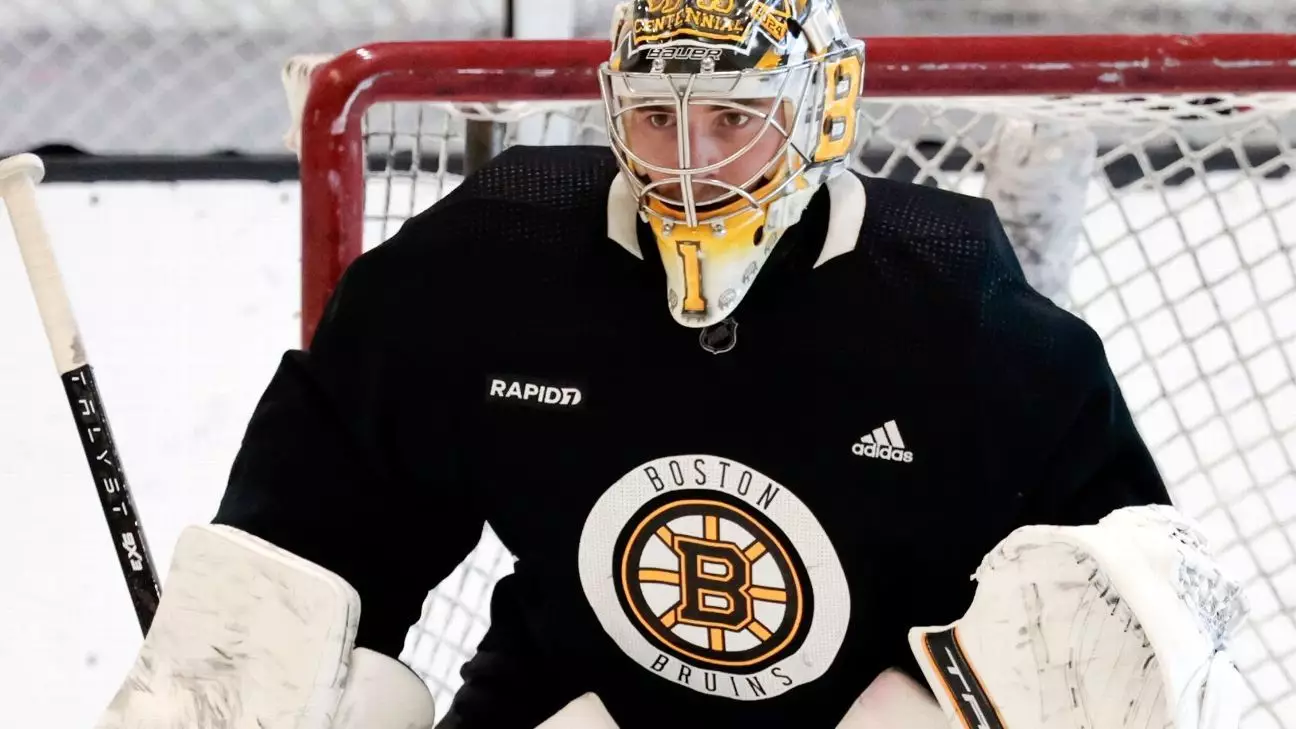In recent days, the contract negotiations between the Boston Bruins and 25-year-old restricted free-agent goaltender Jeremy Swayman have become increasingly fraught with tension. The stalemate escalated as Swayman’s agent, Lewis Gross, publicly contradicted the Bruins’ assertions concerning the contract proposals made to Swayman. This discord culminated in Swayman’s decision to forgo participation in the Bruins’ training camp as he awaits a deal that satisfies both parties. This situation not only raises questions about Swayman’s future with the team but also reflects broader implications for the Bruins’ approach to salary cap management and player negotiations.
Impacts on Team Dynamics and Season Outlook
With the Bruins’ season opener against the Florida Panthers approaching on October 8, the absence of Swayman has left the team in a precarious position, indicating possible turmoil within the locker room. Head coach Jim Montgomery has implied that Joonas Korpisalo will likely take the reins as the starting goaltender in Swayman’s absence. In the context of the Bruins’ performance last season, Swayman was pivotal to their success, showcasing impressive statistics with a .919 save percentage and a 2.34 goals-against average. It’s critical to note that during his tenure alongside former goaltender Linus Ullmark, Swayman helped create one of the most formidable duos in the league, leading to a low goals-against average.
The forced transition following Ullmark’s trade to the Ottawa Senators marks a significant turning point for the Bruins and ultimately signals an intent to recalibrate their strategy. Bruins team president Cam Neely’s comments encapsulate a sense of urgency surrounding the negotiations but also reveal an underlying expectation for Swayman to align with the team’s financial frameworks.
As the negotiation process continues, stark contrasts have emerged between the expectations of Swayman and those held by the Bruins’ management. Neely’s surprise at Swayman’s reported asking price reflects a schism in how both parties perceive value. While the Bruins contemplate their options within the confines of salary cap restrictions, Swayman’s camp appears to be pushing to set a new precedent for goalie contracts—an outcome that would require considerable financial commitment from the franchise.
The tumult has raised eyebrows, particularly as Gross took the unusual step of addressing the media directly regarding the negotiations. By contesting the Bruins’ claims and disclosing specifics about their talks, Gross injects a level of transparency that could hinder future negotiations not just for Swayman, but for the team as a whole. The tactic indicates that the relationship between player and management is decidedly strained and that both sides may require substantial concessions to pave the way for a resolution.
Future Implications for the Bruins’ Strategy
While Swayman’s individual aspirations to secure a lucrative contract are understandable given his performance and potential, this impasse puts the Bruins in a challenging predicament. General manager Don Sweeney’s handling of the situation has drawn criticism, particularly regarding the timing of Ullmark’s trade. Critics argue that not securing a deal with Swayman prior to moving Ullmark hampered the Bruins’ leverage in negotiations. The juxtaposition of maintaining competitiveness while managing a tight salary cap has posed intricate problems for Sweeney, who is now left needing to re-evaluate the team dynamics in light of Swayman’s uncertain status.
Moreover, reports suggest that the Bruins have entertained the idea of an eight-year contract with Swayman, with figures potentially reaching upwards of $9.5 million in average annual value—a significant number that would place Swayman among the highest-paid goaltenders in the NHL. Such a contract would signal the Bruins’ commitment to Swayman not just as a player but as a cornerstone of their future success. Yet, the continued discord signals that reaching an agreement may not be straightforward.
As the deadline for Swayman’s contract eligibility looms on December 1, the urgency for both Swayman and the Bruins intensifies. Failure to reach a resolution could lead to protracted uncertainty that adversely affects both Swayman’s relationship with the Bruins and the team’s competitiveness in the upcoming season. The coming weeks will be critical not just for Swayman, whose aspirations hinge on this negotiation, but also for the Bruins, as they navigate this fraught landscape in hopes of securing a contract that aligns with their long-term goals.
In summation, the intersection of player aspirations and team management philosophies often manifests in challenging negotiations, as evidenced by the ongoing situation between Jeremy Swayman and the Boston Bruins. In a sport where both individual performance and team dynamics are essential, finding common ground will not only determine Swayman’s future but will also shape the trajectory of the Bruins as they aim for success this season and beyond.


Leave a Reply